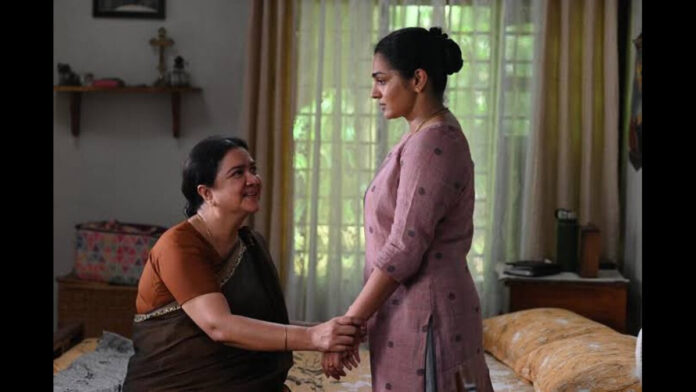Funerals have a certain quality that lends themselves to storytelling, whether it’s the drama that surrounds the deceased on their behalf or the sense of finality that heralds new beginnings. In one such movie, Christo Tomy’s Ullozhukku, which means “undercurrent,” a death in the family triggers a wave of emotions.
Despite the fact that Anju’s (Parvathy) Kuttanad home is inundated, she feels adrift. Her narrative is rendered with skill. Young woman blushing in saree shop; uneasy bride maintaining pretences on boat; reluctant wife in bed; frustrated nurse to ailing man. Christo lets us piece the puzzle together; he doesn’t fill in the blanks with rambling explanations or flashbacks. Yes, this makes for an intriguing screenplay, but part of the reason for this is that the audience is so accustomed to the tale. The discontent of a young lady who believes marriage is her destiny.
Her mother-in-law is Anju’s Leelamma (Urvashi). She is affectionate with Anju as well as her bedridden son. Both ladies are grieving, one for the life that was taken from her, and the other for the life that she believes she had lived. You can never forget that Parvathy and Urvashi are actors, even for a split second. The chats and looks they share with one another drive a large portion of the plot. The two performers are outstanding as they fully immerse themselves in their different roles.
There is nothing that Urvashi cannot do on screen, and she is magnificent as Leelamma, portraying a mother in mourning and also a woman who must confront her own guilt and secrets. From suffocating love to righteous anger, Urvashi’s sterling performance captures it all. Parvathy is raw and edgy as Anju – she is guilty, too, but there’s a quiet sense of assertion in how she speaks. There’s a brutal honesty in her manner, a woman who has been forced to toe the line and is yet constantly drawing boundaries whenever she can. She will clean her bedridden husband’s body but not his genitals. When an older woman attempts to kiss her belly, she makes her rejection known. Leelamma’s crimes are more likely to be forgiven in a patriarchal society than Anju’s. It is credit to the uninhibited and brilliant Parvathy (and the excellent writing) that Anju doesn’t become a convenient villain. She is cold but only because she was thrust into this winter from a spring she wasn’t ready to leave.
Much of the film is set inside their home, the women going from room to room, bearing their respective burdens. Sometimes framed behind the bars of the window, watching the ceaseless rain. The river they must cross to go to town is also a metaphor for the journeys they must make. Each of these trips leads to a significant chapter, an understanding or a reconciliation. Nothing might be said, but the undercurrent within propels them forward. The editing (Kiran Das) is seamless, and Sushin Shyam’s background score creates ripples – just the right amount of doubt and discomfort – as the story flows like water.
The male characters are on the sidelines. Prasant Murali as the bedridden husband hardly speaks and yet he is effective as Thomaskutty. He doesn’t feel like a one-dimensional character and this is because we see him through the two women around him. He is neither an angel nor a monster. He has a presence in the film and isn’t merely an object of pity or revulsion.
Arjun Radhakrishnan’s Rajeev is a waiter – ironically, all he does is make the most important person in his life wait and wait for eternity. I wish this character had more shades to him. Not only does his behaviour seem predictable, but the storyline unintentionally supports the notion that women who pursue forbidden loves will inevitably suffer the consequences of their actions. This is also implied by the camera’s emphasis on Anju’s father’s (Alencier) face at a pivotal moment, which displays an expression of relief and approbation.
It would be unjust to see Ullozhukku only through this lens, though, as the two ladies discover from their individual experiences that love is ultimately an illusion they are chasing. And if they have to own it someday, they will have to create their own unimaginable solidarities in order to build their own reality. Furthermore, if the rain decides there must be a flood, who can stop it?




